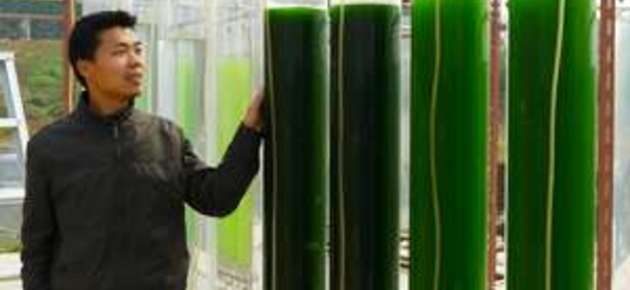Dissertation: Sustainable Biodiesel Production from Microalgae Cultivated with Piggery Wastewater


– Using microalgae as a biofuel feedstock holds many advantages in relation to the environment, food security and land use, Zhu explains.
The integrated approach, which combines freshwater microalgae C. zofingiensis cultivation with piggery wastewater treatment, is a promising solution for nutrient removal and biodiesel production. Diluted piggery wastewater with 1900 mg L–1 COD provided an optimal nutrient concentration for C. zofingiensis cultivation, where advantageous nutrient removal and the highest productivities of biomass, lipid and biodiesel were presented.
When recycling harvest water to re-cultivate C. zofingiensis, it was found that nutrient limitation could favor lipid accumulation. The N- and P-limited medium showed the highest FAME yield at 10.95% of dry weight, while the N-limited culture and P-limited culture shared the highest biodiesel productivity at around 20 mg L–1 day–1. It was also shown that harvest water could be 100% recycled twice to prepare a full nutrient medium to re-grow C. zofingiensis.
The potential to scale up production was tested, using the diluted piggery wastewater with the optimal concentration to grow C. zofingiensis.
– Use of NaClO is an effective and easy way to pretreat piggery wastewater without any obvious impacts on the nutrient removal and the productivity of biomass, lipid and biodiesel, Zhu tells.
In an uncontrolled outdoor environment C. zofingiensis could grow well to robustly accumulate biomass and lipids. The results also indicated that the semi-continuous feeding operation, replacing 50% of microalgae culture with fresh wastewater every 1.5 days, could provide a stable net biomass productivity of 1.314 g L–1 day–1.
– These findings plus the potential of harvest water recycling can lead to the conclusion that C. zofingiensis cultivation in piggery wastewater for nutrient removal and biodiesel production is potentially scalable, says Zhu.
Therefore, C. zofingiensis cultivation in piggery wastewater for biodiesel production can realize environmental sustainability, especially water sustainability. However, its cost-effectiveness should be further enhanced in future via methods such as algal biological property improvement. Undoubtedly, microalgae biodiesel production using wastewater is an apparently promising solution offering all-round sustainability. However, this can only be realized if the economic viability of large-scale production is improved.
The public examination of Zhu’s doctoral dissertation ”Sustainable Biodiesel Production from Microalgae Cultivated with Piggery Wastewater” will be on Tuesday 28 January at 12 o´clock in auditorium Nissi (Tritonia). Professor Donald Huisingh (University of Tennessee) will act as an opponent and Professor Josu Takala as a custos.